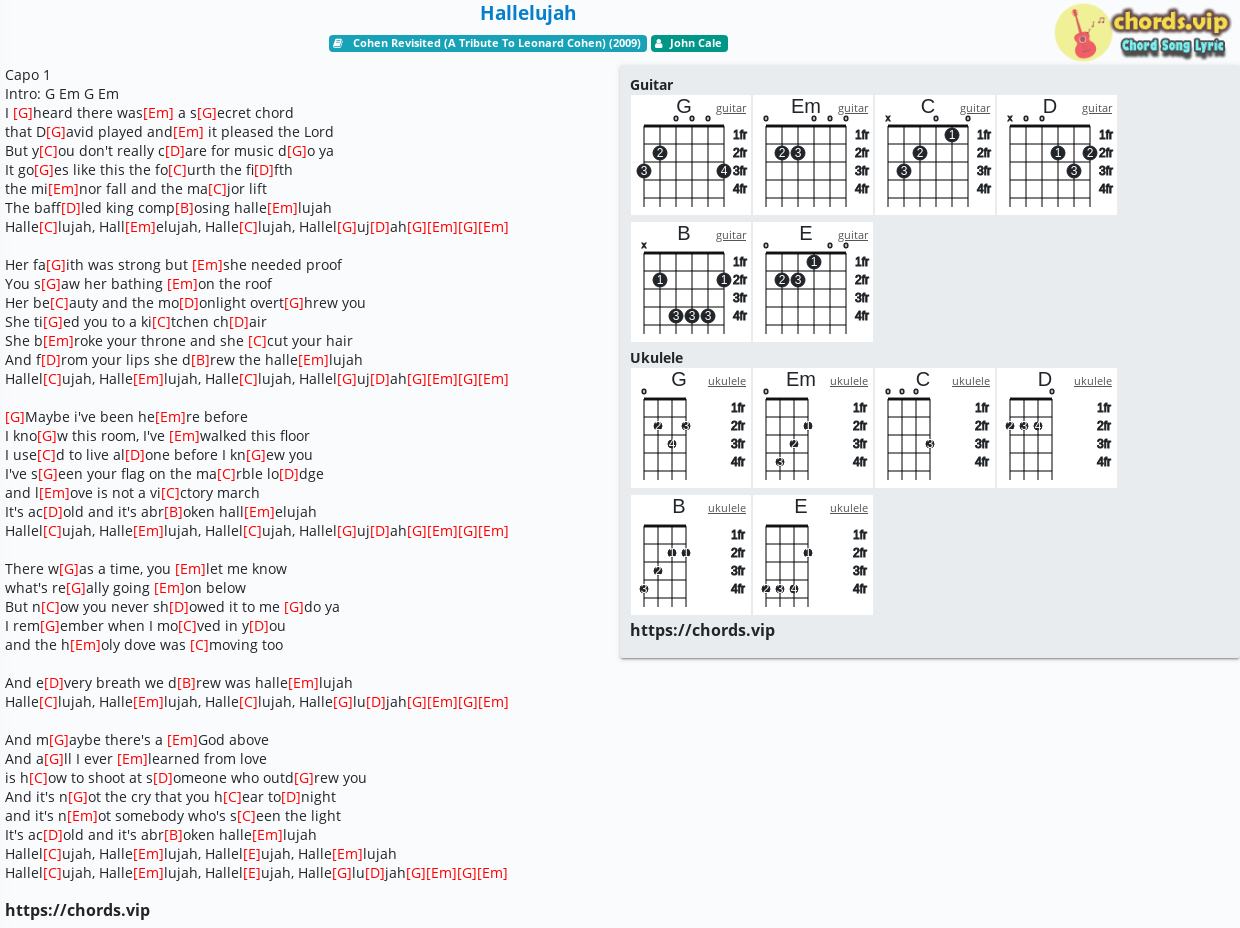
I think it's a good song, but I think too many people sing it.
#HALLELUJAH RUFUS WAINWRIGHT LYRICS MOVIE#
I was just reading a review of a movie called Watchmen that uses it and the reviewer said – "Can we please have a moratorium on 'Hallelujah' in movies and television shows?" And I kind of feel the same way. In an April 2009 CBC Radio interview, Cohen said he found the number of covers of his song "ironic and amusing", given that his record label refused to release it when he first wrote it however, he then claimed the song could benefit from a break in exposure: Different interpretations of the song may include different verses, out of the over 80 verses Cohen originally wrote. It has been the subject of a BBC Radio documentary, a book, and been in the soundtracks of numerous films and television programs. Statistics from the Recording Industry Association of America (RIAA), the Canadian Recording Industry Association, the Australian Recording Industry Association, and the International Federation of the Phonographic Industry, show that, by late 2008, more than five million copies of the song sold in CD format.

Since 1991, "Hallelujah" has been performed by a wide variety of singers: over 300, and in various languages. ^ Shipments figures based on certification alone. US Hot Rock & Alternative Songs ( Billboard) Charts Chart (1985–2016)Ĭzech Republic ( Singles Digitál Top 100) It's being caught between those two places." Former Barenaked Ladies frontman Steven Page, who sang the song at Canadian politician Jack Layton's funeral, described the song as being "about disappointing people". lang said in an interview shortly after Cohen's death that she considered the song to be about "the struggle between having human desire and searching for spiritual wisdom. Numerous singers mix lyrics from both versions, and occasionally make direct lyric changes for example, in place of Cohen's "holy dove", Canadian-American singer Rufus Wainwright substituted "holy dark", while Canadian singer-songwriter Allison Crowe sang "holy ghost".Ĭohen's lyrical poetry and his view that "many different hallelujahs exist" is reflected in wide-ranging covers with very different intents or tones, allowing the song to be "melancholic, fragile, uplifting joyous" depending on the performer: The Welsh singer-songwriter John Cale, the first person to record a cover version of the song (in 1991), promoted a message of "soberness and sincerity" in contrast to Cohen's dispassionate tone the cover by Jeff Buckley, an American singer-songwriter, is more sorrowful and was described by Buckley as "a hallelujah to the orgasm" Crowe interpreted the song as a "very sexual" composition that discussed relationships Wainwright offered a "purifying and almost liturgical" interpretation and Guy Garvey of the British band Elbow made the hallelujah a "stately creature" and incorporated his religious interpretation of the song into his band's recordings.

įollowing his original 1984 studio-album version, Cohen performed the original song on his world tour in 1985, but live performances during his 19 tours almost invariably contained a quite different set of lyrics. His original version, as recorded on his album Various Positions, contains several biblical references, most notably evoking the stories of Samson and Delilah from the Book of Judges ("she cut your hair") as well as King David and Bathsheba ("you saw her bathing on the roof, her beauty and the moonlight overthrew you"). Ĭohen wrote around 80 draft verses for "Hallelujah", with one writing session at the Royalton Hotel in New York where he was reduced to sitting on the floor in his underwear, banging his head on the floor. Written in the key of C major, the chord progression matches lyrics from the song: "goes like this, the fourth, the fifth, the minor fall, and the major lift": C, F, G, A minor, F. "Hallelujah", in its original version, is in 12Ĩ time, which evokes both early rock and roll and gospel music. Problems playing these files? See media help. In 2007, Sony BMG rereleased the album (subtitled "The Legacy Edition") with a live music video of the song.


"Hallelujah" experienced renewed interest following Cohen's death in November 2016 and appeared on many international singles charts, including entering the American Billboard Hot 100 for the first time. The song has been used in film and television soundtracks and televised talent contests. Achieving little initial success, the song found greater popular acclaim through a recording by John Cale, which inspired a recording by Jeff Buckley.įollowing its increased popularity after being featured in the film Shrek (2001), many other arrangements have been performed in recordings and in concert, with over 300 versions known. " Hallelujah" is a song written by Canadian singer Leonard Cohen, originally released on his album Various Positions (1984).


 0 kommentar(er)
0 kommentar(er)
